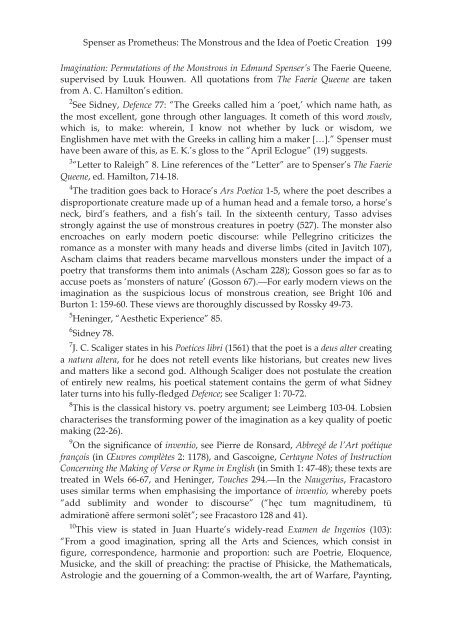Connotations 18.1-3 (2008/2009)
Connotations 18.1-3 (2008/2009)
Connotations 18.1-3 (2008/2009)
You also want an ePaper? Increase the reach of your titles
YUMPU automatically turns print PDFs into web optimized ePapers that Google loves.
Spenser as Prometheus: The Monstrous and the Idea of Poetic Creation<br />
Imagination: Permutations of the Monstrous in Edmund Spenser’s The Faerie Queene,<br />
supervised by Luuk Houwen. All quotations from The Faerie Queene are taken<br />
from A. C. Hamilton’s edition.<br />
2<br />
See Sidney, Defence 77: “The Greeks called him a ‘poet,’ which name hath, as<br />
the most excellent, gone through other languages. It cometh of this word ποιεῖν,<br />
which is, to make: wherein, I know not whether by luck or wisdom, we<br />
Englishmen have met with the Greeks in calling him a maker […].” Spenser must<br />
have been aware of this, as E. K.’s gloss to the “April Eclogue” (19) suggests.<br />
3<br />
“Letter to Raleigh” 8. Line references of the “Letter” are to Spenser’s The Faerie<br />
Queene, ed. Hamilton, 714-18.<br />
4<br />
The tradition goes back to Horace’s Ars Poetica 1-5, where the poet describes a<br />
disproportionate creature made up of a human head and a female torso, a horse’s<br />
neck, bird’s feathers, and a fish’s tail. In the sixteenth century, Tasso advises<br />
strongly against the use of monstrous creatures in poetry (527). The monster also<br />
encroaches on early modern poetic discourse: while Pellegrino criticizes the<br />
romance as a monster with many heads and diverse limbs (cited in Javitch 107),<br />
Ascham claims that readers became marvellous monsters under the impact of a<br />
poetry that transforms them into animals (Ascham 228); Gosson goes so far as to<br />
accuse poets as ‘monsters of nature’ (Gosson 67).—For early modern views on the<br />
imagination as the suspicious locus of monstrous creation, see Bright 106 and<br />
Burton 1: 159-60. These views are thoroughly discussed by Rossky 49-73.<br />
5<br />
Heninger, “Aesthetic Experience” 85.<br />
6<br />
Sidney 78.<br />
7<br />
J. C. Scaliger states in his Poetices libri (1561) that the poet is a deus alter creating<br />
a natura altera, for he does not retell events like historians, but creates new lives<br />
and matters like a second god. Although Scaliger does not postulate the creation<br />
of entirely new realms, his poetical statement contains the germ of what Sidney<br />
later turns into his fully-fledged Defence; see Scaliger 1: 70-72.<br />
8<br />
This is the classical history vs. poetry argument; see Leimberg 103-04. Lobsien<br />
characterises the transforming power of the imagination as a key quality of poetic<br />
making (22-26).<br />
9<br />
On the significance of inventio, see Pierre de Ronsard, Abbregé de l’Art poétique<br />
françois (in Œuvres complètes 2: 1178), and Gascoigne, Certayne Notes of Instruction<br />
Concerning the Making of Verse or Ryme in English (in Smith 1: 47-48); these texts are<br />
treated in Wels 66-67, and Heninger, Touches 294.—In the Naugerius, Fracastoro<br />
uses similar terms when emphasising the importance of inventio, whereby poets<br />
“add sublimity and wonder to discourse” (“hęc tum magnitudinem, tū<br />
admirationē affere sermoni solēt”; see Fracastoro 128 and 41).<br />
10<br />
This view is stated in Juan Huarte’s widely-read Examen de Ingenios (103):<br />
“From a good imagination, spring all the Arts and Sciences, which consist in<br />
figure, correspondence, harmonie and proportion: such are Poetrie, Eloquence,<br />
Musicke, and the skill of preaching: the practise of Phisicke, the Mathematicals,<br />
Astrologie and the gouerning of a Common-wealth, the art of Warfare, Paynting,<br />
199

















